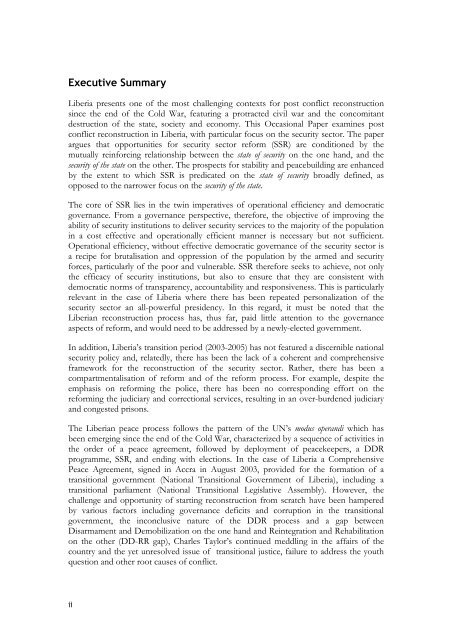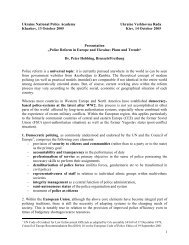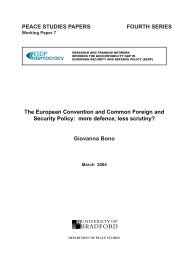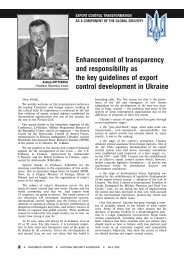The Challenges and Opportunities of Security Sector Reform in Post ...
The Challenges and Opportunities of Security Sector Reform in Post ...
The Challenges and Opportunities of Security Sector Reform in Post ...
You also want an ePaper? Increase the reach of your titles
YUMPU automatically turns print PDFs into web optimized ePapers that Google loves.
Executive Summary<br />
Liberia presents one <strong>of</strong> the most challeng<strong>in</strong>g contexts for post conflict reconstruction<br />
s<strong>in</strong>ce the end <strong>of</strong> the Cold War, featur<strong>in</strong>g a protracted civil war <strong>and</strong> the concomitant<br />
destruction <strong>of</strong> the state, society <strong>and</strong> economy. This Occasional Paper exam<strong>in</strong>es post<br />
conflict reconstruction <strong>in</strong> Liberia, with particular focus on the security sector. <strong>The</strong> paper<br />
argues that opportunities for security sector reform (SSR) are conditioned by the<br />
mutually re<strong>in</strong>forc<strong>in</strong>g relationship between the state <strong>of</strong> security on the one h<strong>and</strong>, <strong>and</strong> the<br />
security <strong>of</strong> the state on the other. <strong>The</strong> prospects for stability <strong>and</strong> peacebuild<strong>in</strong>g are enhanced<br />
by the extent to which SSR is predicated on the state <strong>of</strong> security broadly def<strong>in</strong>ed, as<br />
opposed to the narrower focus on the security <strong>of</strong> the state.<br />
<strong>The</strong> core <strong>of</strong> SSR lies <strong>in</strong> the tw<strong>in</strong> imperatives <strong>of</strong> operational efficiency <strong>and</strong> democratic<br />
governance. From a governance perspective, therefore, the objective <strong>of</strong> improv<strong>in</strong>g the<br />
ability <strong>of</strong> security <strong>in</strong>stitutions to deliver security services to the majority <strong>of</strong> the population<br />
<strong>in</strong> a cost effective <strong>and</strong> operationally efficient manner is necessary but not sufficient.<br />
Operational efficiency, without effective democratic governance <strong>of</strong> the security sector is<br />
a recipe for brutalisation <strong>and</strong> oppression <strong>of</strong> the population by the armed <strong>and</strong> security<br />
forces, particularly <strong>of</strong> the poor <strong>and</strong> vulnerable. SSR therefore seeks to achieve, not only<br />
the efficacy <strong>of</strong> security <strong>in</strong>stitutions, but also to ensure that they are consistent with<br />
democratic norms <strong>of</strong> transparency, accountability <strong>and</strong> responsiveness. This is particularly<br />
relevant <strong>in</strong> the case <strong>of</strong> Liberia where there has been repeated personalization <strong>of</strong> the<br />
security sector an all-powerful presidency. In this regard, it must be noted that the<br />
Liberian reconstruction process has, thus far, paid little attention to the governance<br />
aspects <strong>of</strong> reform, <strong>and</strong> would need to be addressed by a newly-elected government.<br />
In addition, Liberia’s transition period (2003-2005) has not featured a discernible national<br />
security policy <strong>and</strong>, relatedly, there has been the lack <strong>of</strong> a coherent <strong>and</strong> comprehensive<br />
framework for the reconstruction <strong>of</strong> the security sector. Rather, there has been a<br />
compartmentalisation <strong>of</strong> reform <strong>and</strong> <strong>of</strong> the reform process. For example, despite the<br />
emphasis on reform<strong>in</strong>g the police, there has been no correspond<strong>in</strong>g effort on the<br />
reform<strong>in</strong>g the judiciary <strong>and</strong> correctional services, result<strong>in</strong>g <strong>in</strong> an over-burdened judiciary<br />
<strong>and</strong> congested prisons.<br />
<strong>The</strong> Liberian peace process follows the pattern <strong>of</strong> the UN’s modus oper<strong>and</strong>i which has<br />
been emerg<strong>in</strong>g s<strong>in</strong>ce the end <strong>of</strong> the Cold War, characterized by a sequence <strong>of</strong> activities <strong>in</strong><br />
the order <strong>of</strong> a peace agreement, followed by deployment <strong>of</strong> peacekeepers, a DDR<br />
programme, SSR, <strong>and</strong> end<strong>in</strong>g with elections. In the case <strong>of</strong> Liberia a Comprehensive<br />
Peace Agreement, signed <strong>in</strong> Accra <strong>in</strong> August 2003, provided for the formation <strong>of</strong> a<br />
transitional government (National Transitional Government <strong>of</strong> Liberia), <strong>in</strong>clud<strong>in</strong>g a<br />
transitional parliament (National Transitional Legislative Assembly). However, the<br />
challenge <strong>and</strong> opportunity <strong>of</strong> start<strong>in</strong>g reconstruction from scratch have been hampered<br />
by various factors <strong>in</strong>clud<strong>in</strong>g governance deficits <strong>and</strong> corruption <strong>in</strong> the transitional<br />
government, the <strong>in</strong>conclusive nature <strong>of</strong> the DDR process <strong>and</strong> a gap between<br />
Disarmament <strong>and</strong> Demobilization on the one h<strong>and</strong> <strong>and</strong> Re<strong>in</strong>tegration <strong>and</strong> Rehabilitation<br />
on the other (DD-RR gap), Charles Taylor’s cont<strong>in</strong>ued meddl<strong>in</strong>g <strong>in</strong> the affairs <strong>of</strong> the<br />
country <strong>and</strong> the yet unresolved issue <strong>of</strong> transitional justice, failure to address the youth<br />
question <strong>and</strong> other root causes <strong>of</strong> conflict.<br />
ii

















